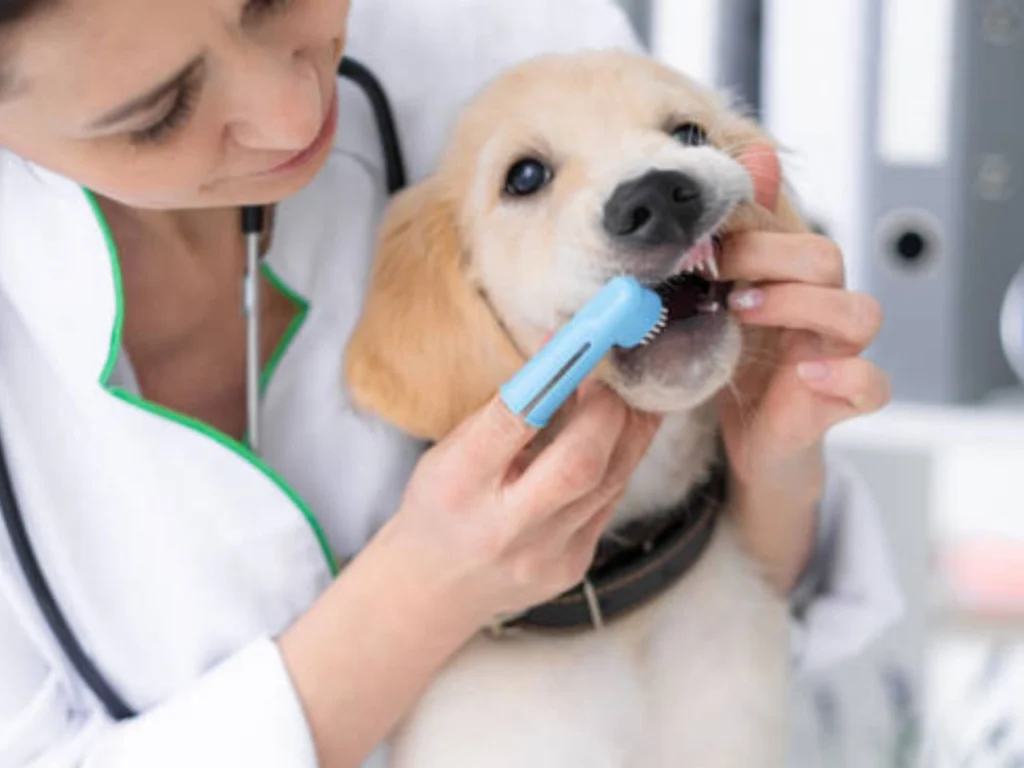
Dental sprays for dogs can be effective for maintaining oral health when used consistently. They help reduce plaque and freshen your breath but should complement regular dental care routines.
Maintaining your dog’s oral health is crucial, and dental sprays have become a popular option for pet owners. These sprays often contain enzymes or antibacterial agents designed to minimize plaque buildup and control tartar formation, leading to better breath and healthier gums.
They are a convenient, quick solution for those looking to upkeep their dog’s dental hygiene between brushings. While not a replacement for brushing or professional cleanings, dental sprays serve as an additional tool in the fight against periodontal disease, which is common in canines. Pet owners seeking a simple, non-invasive way to contribute to their dog’s oral health might find dental sprays to be a beneficial part of their pet care arsenal.
The Buzz Around Dental Sprays For Dogs
Dog owners everywhere are talking about dental sprays for dogs. These products promise to make dog teeth cleaning easier. But do they really work? Let’s dive into the details and see what’s true and what might be just marketing.
Popularity In Pet Care
Dental sprays for dogs have gained a lot of fans. Many pet owners look for simple solutions to take care of their pets’ teeth. Here are a few reasons why these sprays are popular:
- Easy to use: Just spray into your dog’s mouth.
- Quick solution: No need for brushing.
- Appealing to pets: Often flavored to suit dog tastes.
Marketing Claims Vs. Reality
Manufacturers of dental sprays often make big promises. They say these products can reduce tartar and freshen breath. But what does the evidence say?
| Claim | Reality |
| Reduces tartar | Some sprays can help, but they can’t replace brushing. |
| Freshens breath | Effective temporarily, but not a long-term solution. |
Oral Health In Dogs: Why It Matters
Imagine a day without brushing your teeth. Now, imagine never doing it. That’s often the plight of our canine companions. Dental care is crucial for dogs, not just for a bright smile but for their overall health. Neglected teeth can lead to discomfort and serious health issues. Let’s dive into why maintaining your dog’s oral hygiene is essential.
Consequences Of Poor Dental Hygiene
Dogs can’t tell us when they’re in pain. Poor dental hygiene can lead to problems that they silently endure. Here are the consequences:
- Bad breath – Not just unpleasant, it’s a sign of potential disease.
- Tooth decay and loss – Can affect eating and overall health.
- Gum disease – Swollen gums and infections can be agonizing.
Link Between Dental Health And Overall Well-being
Teeth are the gateway to the body. Infections in the mouth can spread. Here are ways dental health and overall well-being are connected:
| Oral Condition | Effect on Body |
| Plaque Build-up | Can enter the bloodstream, affecting organs. |
| Gingivitis | Leads to painful swelling and can cause infections. |
| Periodontal Disease | May increase the risk of heart and kidney diseases. |

Common Dental Problems In Dogs
When it comes to our furry friends, dental health is often overlooked. Yet, common dental problems in dogs can lead to serious health issues if not addressed. Understanding and preventing these problems is key to ensuring our dogs lead happy, healthy lives.
Plaque And Tartar Buildup
Dogs develop plaque and tartar just like humans. These substances coat the teeth and can lead to gum disease if not removed. Regular brushing and dental sprays can help manage this buildup.
- Plaque is a sticky film that forms on teeth.
- Tartar, or calculus, is hardened plaque that attaches firmly to teeth.
Preventing tartar buildup is crucial, as it’s much harder to remove than plaque and often requires professional cleaning.
Signs Of Periodontal Disease
Periodontal disease is a common issue in dogs, affecting most by the age of three. It’s important to spot the early signs to prevent advanced problems.
| Sign | Description |
| Bad breath | A telltale sign of dental issues. |
| Red gums | Indicates inflammation and possible infection. |
| Bleeding gums | Often occurs when eating or during brushing. |
| Loose teeth | Caused by the weakening of supporting structures. |
The Science Behind Dental Sprays
Dental sprays for dogs are designed to promote oral health. They work by targeting plaque and tartar build-up. Understanding the science behind these sprays can help you choose the right product for your furry friend.
Active Ingredients
Dental sprays contain various active ingredients that combat oral bacteria. These ingredients may include:
- Chlorhexidine: This chemical reduces bacteria and plaque.
- Zinc gluconate: It helps prevent tartar build-up.
- Essential oils: Oils like peppermint freshen breath.
Each ingredient plays a role in maintaining a clean mouth and fresh breath.
The Role Of Enzymes In Dental Care
Enzymes in dental sprays break down complex molecules in plaque. They are crucial for preventing dental diseases.
Enzymes like lysozyme attack the cell walls of bacteria. Glucose oxidase turns glucose into hydrogen peroxide, which kills bacteria.
Regular use of enzyme-based dental sprays can lead to better dental health.
Evaluating Effectiveness: Clinical Studies And Evidence
As a pet owner, you’re always looking for ways to keep your furry friend healthy. Dental sprays for dogs promise to do just that for their teeth. But do they work? Let’s dive into what clinical studies and evidence say about these products.
Research Findings
Dental sprays claim to reduce plaque and freshen breath. Scientific research provides insights. Studies show that certain sprays can minimize bacteria levels in a dog’s mouth. This helps in reducing plaque buildup. Researchers tested sprays with enzymes and antibacterial ingredients. These showed positive results in improving dental health.
- Enzyme-based sprays break down plaque.
- Antibacterial sprays target harmful mouth bacteria.
- Many products have vet recommendations.
Limitations Of Existing Studies
While some studies support dental sprays, there are limitations. Study sizes are often small. This makes it hard to generalize findings to all dogs. Also, the research duration varies. Short-term studies may not show long-term effects. It’s crucial to consider these factors when evaluating the sprays.
| Study Aspect | Limitation |
| Sample Size | Often small, limits broader implications |
| Duration | Varies, may not reflect long-term effects |
| Ingredients | Different sprays use various components, and results differ |
Comparing Dental Sprays To Traditional Methods
Maintaining your dog’s dental health is crucial. Various methods exist, each with pros and cons. Let’s explore how dental sprays stack up against traditional care techniques.
Brushing Teeth Vs. Sprays
Brushing your dog’s teeth is the gold standard. It effectively removes plaque and prevents tartar buildup. You use a toothbrush and pet-safe toothpaste. This method requires patience and training but offers the best results.
Dental sprays are newer and more convenient. They contain ingredients that reduce bacteria and freshen your breath. Just spray them directly into your dog’s mouth. No brushing is needed.
| Method | Effectiveness | Convenience |
| Brushing Teeth | High | Low |
| Dental Sprays | Medium | High |
Dental Chews And Toys
Dogs love to chew, making dental chews and toys a great option. They help clean teeth mechanically as your dog chews. They are fun and beneficial.
- Chews work by scraping plaque off the teeth.
- Toys are designed to be durable and clean hard-to-reach areas.
- Both options stimulate gums and reduce boredom.
Remember, while these methods support dental health, they don’t replace professional cleanings. Check with your vet for the best dental care routine.
Pros And Cons Of Using Dental Sprays
Dental sprays for dogs offer a simple solution for pet oral hygiene. But like any product, they have both benefits and drawbacks. It’s essential for pet owners to weigh these before deciding if dental sprays are the right choice for their furry friends.
Ease Of Use
Dental sprays boast convenience as a major plus. They’re quick to apply, typically involving just a squirt inside your dog’s mouth. This makes them a time-saver for busy pet owners. Unlike brushing, there’s no need for a toothbrush or to wrestle with your pooch to clean each tooth.
- Time-efficient: Takes only seconds to apply.
- No brushing: Avoids the hassle of using a toothbrush.
- Good for fussy pets: Ideal for dogs who dislike brushing.
Potential Side Effects
While dental sprays can be effective, there are possible side effects to consider. Some dogs may experience allergic reactions to certain ingredients. Always check the label and consult with a vet if you’re unsure about the spray’s compatibility with your dog.
| Side Effect | Detail |
| Allergic Reactions | Ingredients may cause allergies in some dogs. |
| Gastrointestinal Issues | Can lead to stomach upset or diarrhea. |
| Respiratory Problems | Some sprays may cause breathing difficulties. |
Veterinarian Insights On Dental Sprays
Keeping our furry friends’ teeth clean is a priority for pet owners. Dental sprays for dogs are gaining popularity as an easy, non-invasive way to help maintain oral health. Veterinarians often weigh in on these products, offering professional insights based on their experience and knowledge in pet healthcare.
Professional Recommendations
Most vets agree that dental hygiene is crucial for a dog’s overall health. They often recommend dental sprays as part of a comprehensive oral care routine. These sprays can reduce plaque and freshen your breath. However, they should not replace regular brushing or dental check-ups.
- Look for sprays with enzymes that break down plaque.
- Choose alcohol-free options to avoid irritation.
- Verify the product’s efficacy with the Veterinary Oral Health Council (VOHC).
Case Studies
Research and case studies offer insights into the effectiveness of dental sprays. A study of 20 dogs showed a noticeable reduction in tartar after using a specific dental spray for 30 days. Another case study highlighted an older dog with halitosis that experienced fresher breath post-regular use of a vet-recommended dental spray.
| Dog’s Age | Condition Before | Condition After | Duration of Use |
| 4 years | High Plaque | Plaque Reduced | 30 days |
| 9 years | Bad Breath | Improved Breath | 60 days |
User Experiences: Testimonials And Reviews
Dental sprays for dogs are popular among pet owners. Many share their experiences online. These stories help others decide if they should try these products.
Success Stories
Many dog owners report positive results from using dental sprays. They notice fresher breath and cleaner teeth in their pets.
- Jane from New York says, “My dog’s breath got much better! Very happy.”
- Mike in California notes, “Teeth cleaning is easier now. Plaque seems reduced.”
These success stories highlight the benefits of dental sprays.
Reports Of Ineffectiveness
However, not all feedback is positive. Some users do not see any improvement.
| Owner | Experience |
| Lisa from Florida | No change in breath or dental health. |
| Sam in Texas | Used for a month, no visible benefits. |
How To Choose The Right Dental Spray
Choosing the right dental spray for your dog can make a big difference in their oral health. Dental sprays for dogs are designed to reduce plaque, freshen breath, and maintain healthy gums. But with so many options available, how do you pick the best one? Let’s dive into the key factors to consider when selecting a dental spray for your furry friend.
Ingredients To Look For
Effective dental sprays for dogs should have safe, beneficial ingredients. Look for products containing:
- Enzymes that break down plaque and tartar.
- Chlorhexidine is an antiseptic for reducing bacteria.
- Natural essential oils like peppermint for fresh breath.
- Aloe vera to soothe gum irritation.
Avoid sprays with alcohol, xylitol, or artificial sweeteners, as they can be harmful to dogs.
Understanding Product Labels
Reading product labels is crucial for choosing a safe dental spray. Look for:
| Symbol | Meaning |
| Veterinary Oral Health Council (VOHC) Seal | Indicates efficacy in controlling plaque and tartar. |
| Natural Product | Contains ingredients from natural sources. |
| Non-Toxic | Safe if ingested by your dog. |
Integrating Dental Sprays Into Your Dog’s Routine
Keeping your dog’s teeth clean is vital for their overall health. Dental sprays for dogs are a quick and easy solution. They help reduce plaque and freshen breath. For busy pet owners, these sprays can be a lifesaver. Let’s dive into how to make dental sprays a part of your dog’s daily care.
Best Practices
- Choose a high-quality dental spray with safe ingredients.
- Start slowly to get your dog used to the spray.
- Gently lift your dog’s lip to apply the spray directly to their teeth and gums.
- Combine with regular brushing for the best results.
- Consult your vet before starting any new dental routine.
Frequency And Dosage
Each product has its own guidelines for use. Always follow the instructions on the bottle. A general rule is to use dental sprays once or twice daily. Here’s a simple chart to help:
| Product | Daily Use |
| Basic Dental Spray | 1-2 sprays per side |
| Advanced Care Spray | 2-3 sprays per side |
Beyond Sprays: Holistic Approach To Dental Care
While dental sprays for dogs can help freshen breath and reduce plaque, they are just one piece of the puzzle. A holistic approach to your dog’s dental health includes various factors. This ensures strong teeth and healthy gums throughout their life. Let’s explore some key elements of comprehensive dental care for your furry friend.
Dietary Considerations
What your dog eats plays a significant role in their dental health. Hard kibble can help scrape away plaque. Chew toys and treats designed for dental health also contribute. Ensure your dog’s diet supports their overall tooth and gum well-being.
- Raw bones – natural teeth cleaners
- Crunchy veggies – great for oral health
- Quality kibble – reduces tartar build-up
Regular Veterinary Check-ups
Professional cleanings and exams are crucial. Your vet can spot issues early and provide treatments. This keeps your dog’s mouth in top shape. Schedule dental check-ups at least once a year.
| Check-up Frequency | Benefits |
| Annual | Prevents serious dental issues |
| Bi-annual | Ideal for breeds with dental risks |
FAQ(do dental sprays for dogs really work)
Does Oral Spray Work On Dogs’ Teeth?
Yes, oral sprays can be effective for maintaining dogs’ dental health by reducing plaque and freshening breath when used as directed.
Do Dental Sprays Work?
Dental sprays can be effective for freshening breath and reducing bacteria in a dog’s mouth. However, they are not a substitute for regular teeth brushing or veterinary dental care. Always consult your vet before using new dental products on your pet.
Do Dental Water Additives For Dogs Work?
Yes, dental water additives can help maintain your dog’s oral health by reducing plaque and freshening breath. Regular use contributes to overall dental hygiene.
How Do You Dissolve Plaque On Dogs Teeth?
Dissolve plaque on dogs’ teeth by using enzymatic toothpaste and daily brushing. Offer dental chews and toys that promote chewing. Schedule regular dental cleanings with your vet.
Caring for your dog’s dental health is essential. Dental sprays are convenient, backed by positive testimonials and veterinary support. While not a standalone solution, they can complement regular dental routines. For best results, consult your vet and always prioritize comprehensive oral care for your furry friend.











